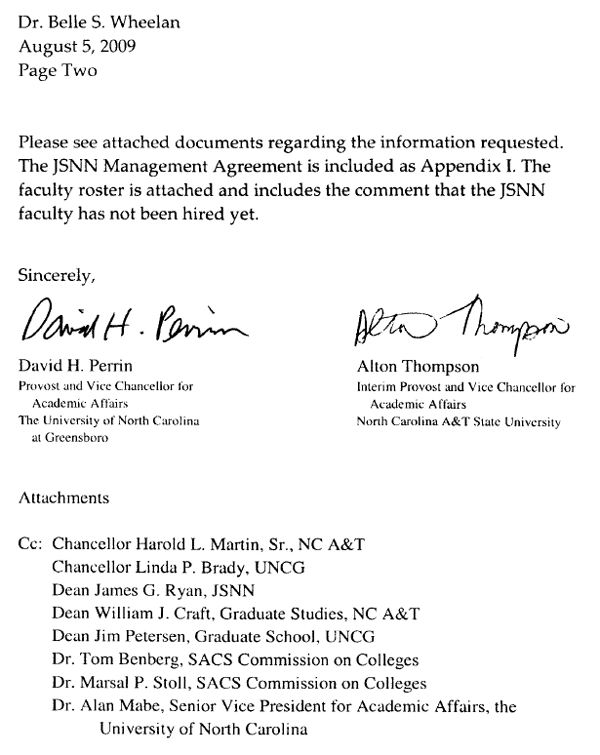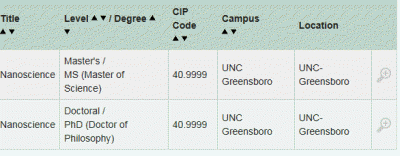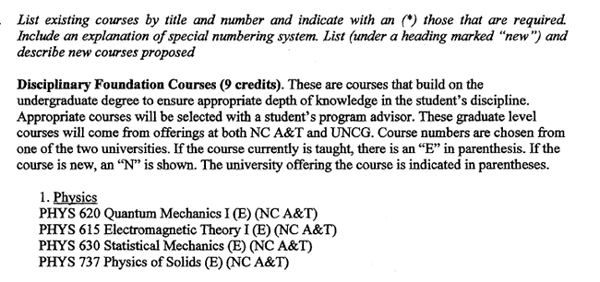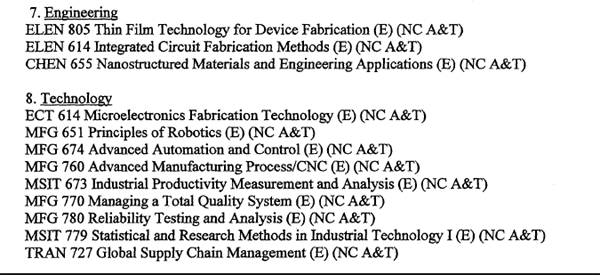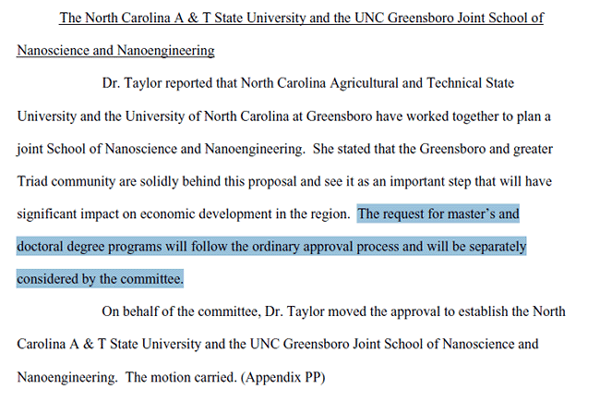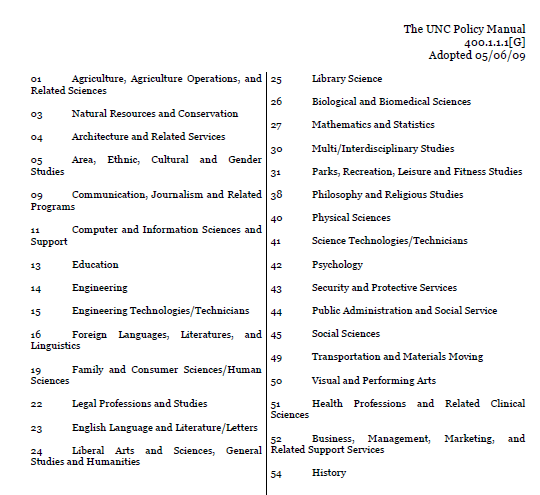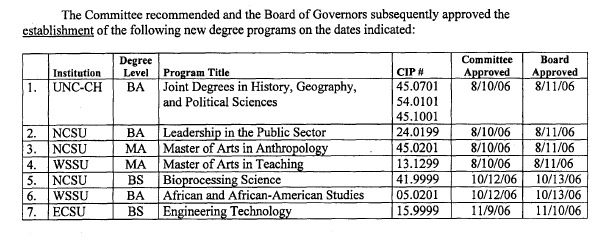| |
   North
Carolina Confederate / Trump
Leopard UNC Board of Governors/ UNC
System complicit with Greensboro Business
organizations and UNC Greensboro has
not changed their spots. In
1970, the United States Department
of Health, Education, and Welfare
notified the University of North
Carolina System that it was
violating Title VI of the Civil
Rights Act of 1964 by maintaining a
racially dual system of public
higher education. North
Carolina Confederate / Trump
Leopard UNC Board of Governors/ UNC
System complicit with Greensboro Business
organizations and UNC Greensboro has
not changed their spots. In
1970, the United States Department
of Health, Education, and Welfare
notified the University of North
Carolina System that it was
violating Title VI of the Civil
Rights Act of 1964 by maintaining a
racially dual system of public
higher education. |
| |
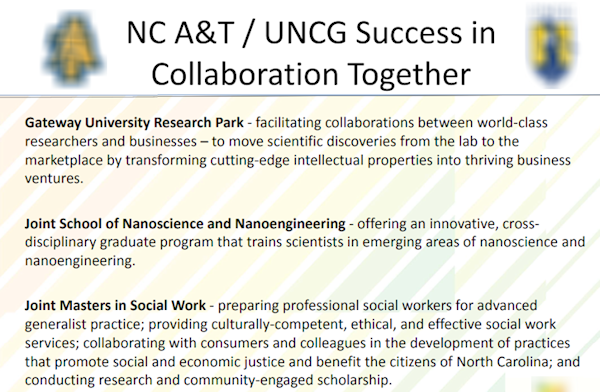 |
 |
|
|
| |
|
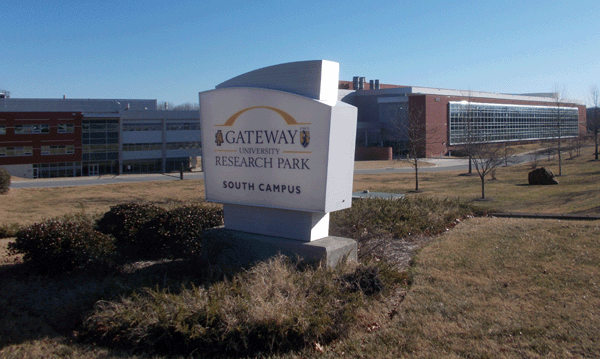 |
|
"A Promise for the Future By some accounts,
nanotechnology is destined to replace much of today's
technology. Gateway University Research Park expects to
be at the forefront of these new technologies with the
creation of a new
institution the
Joint School for Nanoscience and Nanoengineering
(JSNN)" [15] “The
Joint School for Nanoscience and Nanoengineering…..
built on the major nanotechnology research activity been
established. at Wake forest and NCA&T” [13] [15] The
intent of the (JSNN) school is to become a world-class
educational and technical institution.
[34]. |
|
| |
 UNC
Board of Governors/ UNC System Institutional
Racism, and Corruption: Alleged designation
of NCGS:
116-198.34. (8b), NC
A&T/UNCG Joint
Millennial Campus, complicity
with Greensboro Business organizations, HWI UNC
Greensboro, Gateway Research Park, and
Southern Commissioner on Colleges, cannibalizing HBCU NC
NCA&T academic programs, land, research and
facilities via bogus UNC System Office alleged
millennial Campus /aka/ NCAT/UNCG Joint
Millennial Campus Gateway Research Park, and
alleged Joint School of Nanoscience and
Nanoengineering, depriving
NCA&T HBCU Students equal protection of the law. UNC
Board of Governors/ UNC System Institutional
Racism, and Corruption: Alleged designation
of NCGS:
116-198.34. (8b), NC
A&T/UNCG Joint
Millennial Campus, complicity
with Greensboro Business organizations, HWI UNC
Greensboro, Gateway Research Park, and
Southern Commissioner on Colleges, cannibalizing HBCU NC
NCA&T academic programs, land, research and
facilities via bogus UNC System Office alleged
millennial Campus /aka/ NCAT/UNCG Joint
Millennial Campus Gateway Research Park, and
alleged Joint School of Nanoscience and
Nanoengineering, depriving
NCA&T HBCU Students equal protection of the law. |
|
| |
|
| |
|
"The goal isn't to expand
mankind's body of knowledge so much as it is to expand
the local economy." [19] |
|
| |
 |
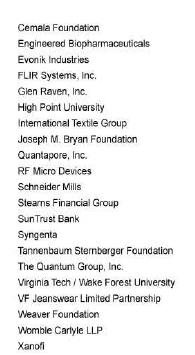 |
|
Rewinding to 1991-92, at
bequest of UNC Board of
Governors NC Legislature
enacted NC GA § 116‑252.
Piedmont Triad
Graduate Engineering
Program in support
faculty and graduate
students involved in
engineering at the
campuses of The
University of North
Carolina. In doing so
UNC Board of Governors
rejected a $20
Million dollar
NCA&T/UNC-G Engineering
and Science Research
Center. |
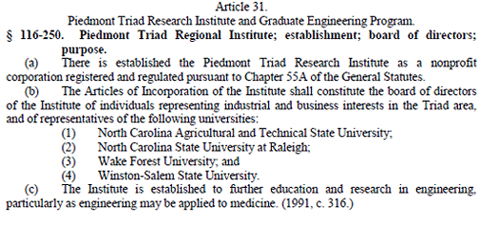 |
|
|
|
|
 Reported
in the Media: " "but
that center [Piedmont Triad Engineering Research
Center] contains no role Reported
in the Media: " "but
that center [Piedmont Triad Engineering Research
Center] contains no role 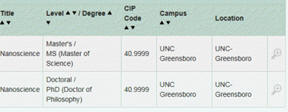 for UNCG,
which had hoped
to get several doctoral level programs out
of a joint engineering and science research
center with A&T", emphasis added; "UNCG/A&T
proposal had won the enthusiastic
endorsement of top Greensboro
business leaders. Acting through the Greensboro
Development Corp., they last year
commissioned a $300,000 study to determine
what areas of research at UNCG/A&T center
could engage in to the benefit of the
Triad economy and its industries"; and
I'm for UNCG,
which had hoped
to get several doctoral level programs out
of a joint engineering and science research
center with A&T", emphasis added; "UNCG/A&T
proposal had won the enthusiastic
endorsement of top Greensboro
business leaders. Acting through the Greensboro
Development Corp., they last year
commissioned a $300,000 study to determine
what areas of research at UNCG/A&T center
could engage in to the benefit of the
Triad economy and its industries"; and
I'm  [banker
E.S. ``Jim'' Melvin, chairman of the
Greensboro Development Corp convinced
it [Research Center] is the thing to do,
but we've got to work through the university
system, build the case for it and get it
high on the board's priority
list. That's going to [banker
E.S. ``Jim'' Melvin, chairman of the
Greensboro Development Corp convinced
it [Research Center] is the thing to do,
but we've got to work through the university
system, build the case for it and get it
high on the board's priority
list. That's going to  take
some time.'' reported Jack Scism TRIAD
SCIENTIFIC RESEARCH CENTER: VIABLE DREAM OR
PIE IN THE SKY? , JACK SCISM, Greensboro
News & Record - Monday, July 20, 1992 .
(emphasis added) [16] take
some time.'' reported Jack Scism TRIAD
SCIENTIFIC RESEARCH CENTER: VIABLE DREAM OR
PIE IN THE SKY? , JACK SCISM, Greensboro
News & Record - Monday, July 20, 1992 .
(emphasis added) [16] |
| |
|
|
"Its
[UNCG] historically strong programs in music, education
and nursing are not the kinds of programs that spin off
research and development or software companies to fuel
high tech economies " "Last
year, the development corporation proposed the idea of
developing a UNCG/A&T Knowledge and Industry Campus,
perhaps in southeast Greensboro...This would be the
beginning of our version of N.C. State's Centennial
Campus." [Ken Mayer, Editorial, UNCG, A&T University
will need to be leaders in the charge for high-tech
industry in the Triad, Triad Business Journal Nov
9,1998] Ken Mayer former Chairman UNCG BOT 2003-2004 &
2004-2005. |
| |
|
 |
| The [UNC-G] Associate
Provost for Research and Partnerships serves
on the Government Relations council for the
Greensboro Partnership and through this role
contributed to the lobbying efforts with the
state legislators for funding for the Joint
School of Nanoscience and
Nanoengineering. The College [College of
Arts and Sciences] was a central player in
the continuing work to establish the Joint
School of Nanoscience and Nanoengineering
with NCA&T University. Degrees or programs
being considered for the future· MS in
Nanoscience and Ph.D. in Nanoscience. [UNC-G
Curricular Planning, Academic Affairs Annual
Report AY 2007/08] |
|
|
| |
 "I
think for the next 50 years, A&T and the
engineering programs and science programs
are going to be an integral part and a
driving force in the economic development of
the community,'' said Greensboro attorney
Jim Phillips Jr., a member of the UNC Board
of Governors."
[3] "I
think for the next 50 years, A&T and the
engineering programs and science programs
are going to be an integral part and a
driving force in the economic development of
the community,'' said Greensboro attorney
Jim Phillips Jr., a member of the UNC Board
of Governors."
[3] |
| |
 Greensboro
City's Greensboro
Connections 2025 Comprehensive Plan was
adopted May
2003. A key principle of
the Comprehensive Plan is to promote
economic development in historically
under-served parts of the City such
as East Greensboro. Properties in
these areas should receive priority
consideration as the City designates
and promotes land for economic
development. The NCA&TSU Farm site
is one such candidate. 7D.3 Promote
economic development through
public/private partnerships to
include government, economic
development agencies, educational
and health care institutions, and
businesses. Build on existing
partnerships and initiatives in this
effort. Examples include: Greensboro
City's Greensboro
Connections 2025 Comprehensive Plan was
adopted May
2003. A key principle of
the Comprehensive Plan is to promote
economic development in historically
under-served parts of the City such
as East Greensboro. Properties in
these areas should receive priority
consideration as the City designates
and promotes land for economic
development. The NCA&TSU Farm site
is one such candidate. 7D.3 Promote
economic development through
public/private partnerships to
include government, economic
development agencies, educational
and health care institutions, and
businesses. Build on existing
partnerships and initiatives in this
effort. Examples include:
|
|
University-related research and
development opportunities with UNCG
and NCA&TSU (building on the
example of the Nussbaum Center
incubator facility)[ One of
their primary tasks will be keeping
tabs on research at the two
universities, in areas such as
engineering and sciences, that might
have commercial uses. They will look
for existing companies that could
benefit from that research and
explore the potential of using it to
create start-up businesses.]
Work with NCA&TSU to establish a
research park on the A&T farm
property, [NCA&T Farmland was
located in Guilford County not
Greensboro City |
| |
  Loud
and Clear “Harold,
we need North
Carolina A&T State
University to assume
a more prominent
role in helping to
positioning our
region to become
more economic
competitive. I
want to reassure
business leaders I
heard them the loud
and clear”
, said NC A&T
Chancellor Harold
Martin at his 2009
inauguration. Video Loud
and Clear “Harold,
we need North
Carolina A&T State
University to assume
a more prominent
role in helping to
positioning our
region to become
more economic
competitive. I
want to reassure
business leaders I
heard them the loud
and clear”
, said NC A&T
Chancellor Harold
Martin at his 2009
inauguration. Video |
|
| |
| |
|
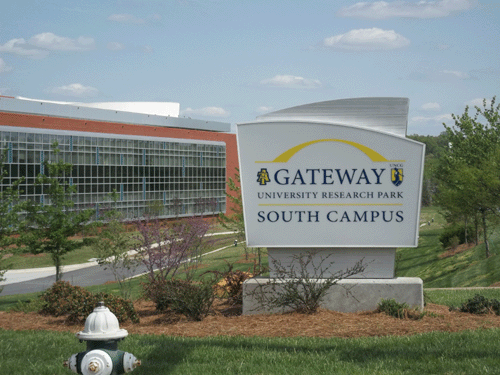 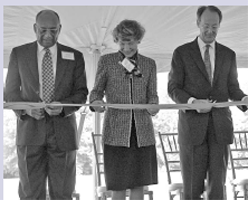 " I
am so energized by the potential of
this research park, in
particular the joint schools of nano
technology and nano science. The
world is seeing explosive growth
today in the commercialization of
nanotechnology. We will have all of
the assets right here in Guilford
County that we need to
participate in that explosion, and
they will be right here at the Gateway
University Research Park." said
("Greensboro Boy" ) Erskine
Bowles President of the University
of North Carolina System. Photo NC
A&T. [2] " I
am so energized by the potential of
this research park, in
particular the joint schools of nano
technology and nano science. The
world is seeing explosive growth
today in the commercialization of
nanotechnology. We will have all of
the assets right here in Guilford
County that we need to
participate in that explosion, and
they will be right here at the Gateway
University Research Park." said
("Greensboro Boy" ) Erskine
Bowles President of the University
of North Carolina System. Photo NC
A&T. [2] |
| |
 "The
Joint School of Nanoscience
and Nanoengineering will be
a unique, interdisciplinary
school, located at the South
Campus of the Gateway
University Research Park, the
joint millennial campus of
NC A&T and UNCG' (
formerly NC A&T farm
property)... “It
[JSNN] will be one of the
most stimulating
opportunities in the history
of the area and will serve
as a national model for
collaboration between two
institutions, one a
historical black institution
and the other a historical
white female institution.” "JSNN
to offer (a) joint
interdisciplinary Ph.D.
degree and (a) joint
professional science
master's degree." "JSNN to
offer (a) joint
interdisciplinary Ph.D.
degree and (a) joint
professional science
master's degree." “The building
would include the academic
departments, laboratory
facilities (teaching and
research), and centers and
institutes of the new
School as
well as selected centers and
institutes currently located
at the partner universities. [5]
Emphasis added "The
Joint School of Nanoscience
and Nanoengineering will be
a unique, interdisciplinary
school, located at the South
Campus of the Gateway
University Research Park, the
joint millennial campus of
NC A&T and UNCG' (
formerly NC A&T farm
property)... “It
[JSNN] will be one of the
most stimulating
opportunities in the history
of the area and will serve
as a national model for
collaboration between two
institutions, one a
historical black institution
and the other a historical
white female institution.” "JSNN
to offer (a) joint
interdisciplinary Ph.D.
degree and (a) joint
professional science
master's degree." "JSNN to
offer (a) joint
interdisciplinary Ph.D.
degree and (a) joint
professional science
master's degree." “The building
would include the academic
departments, laboratory
facilities (teaching and
research), and centers and
institutes of the new
School as
well as selected centers and
institutes currently located
at the partner universities. [5]
Emphasis added |
|
| |
|
|
|
| |
Subject of a policy discussion Nov. 2006, UNC Board of
Governors 2007-2009 Budget Priorities November 10, 2006
called for Pending Board of Governors approval, funding
for the creation of a joint Graduate School of
Nanoscience and Nanoengineering at NCA&T and UNC-G's
Millennium Campus. 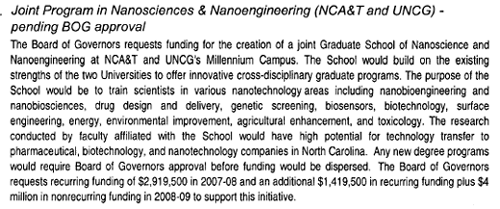 Not
with standing NCA&T board of Trustees had not met.
Subject of a policy discussion UNC Board of Governors
2007-2009 Budget Priorities November 10, 2006 called for
Pending Board of Governors approval, funding for the
creation of a joint Graduate School of Nanoscience and
Nanoengineering at NC A&T and UNC-G's Millennium
Campus. UNC
BOG Committee Not
with standing NCA&T board of Trustees had not met.
Subject of a policy discussion UNC Board of Governors
2007-2009 Budget Priorities November 10, 2006 called for
Pending Board of Governors approval, funding for the
creation of a joint Graduate School of Nanoscience and
Nanoengineering at NC A&T and UNC-G's Millennium
Campus. UNC
BOG Committee |
| |
|
The General
Assembly shall provide that the benefits of
The University of North Carolina and other
public institutions of higher education, as
far as practicable, be extended to the
people of the State free of expense. (NC
Constitution ARTICLE IX EDUCATION Sec. 9.). |
| |
|
|
UNC
BOG Committee on Budget and Finance, April
2006, approved recommending 1.3 million
dollars for planning a Biotechnology Building at
NCA&T to full BOG. Proposed facility would
enable NCA&T to support ongoing and expanding
research activities in bioengineering,
biotechnology, and biomedicine. |
 |
| NC A&T'
biotechnology program is interdisciplinary and
will incorporate research activities currently
housed in the College
of Engineering, College
of Arts and Sciences, and School
of Agriculture and Environment Sciences. The
Total cost of this project is $25 Million
dollars. |
|
UNC Board of Governors 2007-09 budget Priorities bogus
claim the Greensboro Center for Innovative Development-
renamed Gateway University Research Park

as NCAT/UNC-G
Joint Millennial Campus relocated NCA&T College
of Engineering, School
of Technology, Physical
Sciences and Applied Sciences programs and research, off
–campus to the bogus Joint Millennial (with UNCG)
doubling the cost $25
million vs. $50 million |
|
| |
|
Erskine Bowles appointee Interim NC A&T
Chancellor Lloyd V. Hackley and UNCG Chancellor made the
Request to Establish The JSNN March 7, 2006. |
 |
|
|
|
| |
|
Fraudulent claiming HBCU NC A&T and HWI
UNCG were partners in Board of Governors designated
NCGS: 116-198.34. (8b) NC
A&T/UNCG Joint
Millennial Campus.
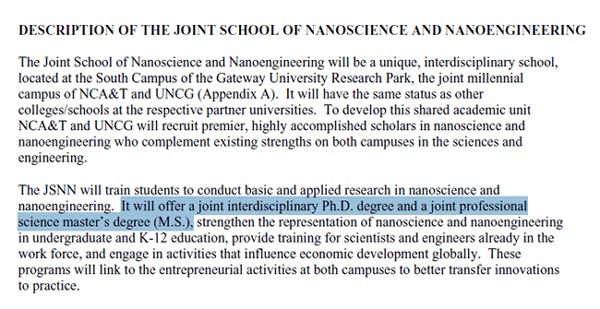
May 2007 UNC Board of Governors established alleged
Joint School of
Nanoscience and Nanoengineering, at bogus NC
A&T / UNCG Joint Millennial Campus, UNCG affiliate,
Gateway University Research Park, Inc.; to offer (a)
joint interdisciplinary Ph.D. degree and (a) joint
professional science master's degree. |
| |
|
| |
|
 |
 |
| The Joint School of Nanoscience and
Nanoengineering will be a unique, interdisciplinary
school, located at the South Campus of the Gateway
University Research Park, the Joint Millennial campus of
the NCA&T and UNCG. |
|
| |
 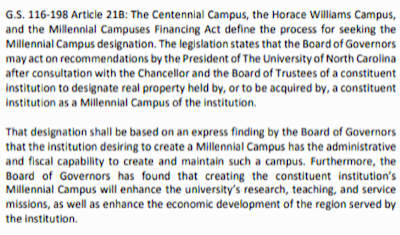 NCGS
116-198-34(8b) That designation shall be
based on an express finding by the Board of
Governors that the institution desiring to
create a Millennial Campus has the
administrative and fiscal capability to
create and maintain such a campus.
Furthermore, the Board of Governors has
found that creating the constituent
institution’s Millennial Campus will enhance
the university’s research, teaching, and
service missions, as well as enhance the
economic development of the region served by
the institution. Video NCGS
116-198-34(8b) That designation shall be
based on an express finding by the Board of
Governors that the institution desiring to
create a Millennial Campus has the
administrative and fiscal capability to
create and maintain such a campus.
Furthermore, the Board of Governors has
found that creating the constituent
institution’s Millennial Campus will enhance
the university’s research, teaching, and
service missions, as well as enhance the
economic development of the region served by
the institution. Video |
|
| |
|
NC A&T reply to public record
request for Board of Governors authorization
to establish Joint Millennial Campus was "we
can not locate the Board of Governors
authorization establishing the Joint
Millennial Campus." |
 |
|
| |
|
Proposed Lease was smoking Gun No
statuary NCGS:
116-198.34.(8b) NC
A&T/ UNCG Joint
Millennial Campus was designated Oct.
10, 2003 by
UNC Board of Governors for
Session Law 2003-284, Section 6.20, land and
facilities, and 75-acre parcel of NCA&T
Farmland. |
| |
| Feb. 2,
2006, Action
Item: Lease
Agreement between
the Greensboro
Center for
Innovative
Development and UNCG
and NC A&T, was
considered by UNCG
Board of Trustees. Action
item background
information timeline
from Feb. 2003
through Feb2, 2006
didn't indicated
JMC was designed by
UNC BOG. |
| |
| Action Item
background
information says "
in order to
facilitate the GCID
ability to perform
its role as
managed/developer it
was determined by
counsel for the
universities and the
GCID to pursue a
master lease for
the properties
identified as the
JMC by
university counsels,
GCID, and General
Administration,
emphasis added. |
 |
|
| Action item
background
information: |
| |
- Timeline
from Feb. 2003
through Feb2,
2006 does not
indicated JMC
was designed by
UNC BOG in 2003,
|
| |
- In order to
facilitate GCID
ability to
perform its role
as
manager/developer
it was
determined by
counsel for the
universities and
the GCID to
pursue a master
lease for
the properties
identified as
the JMC,
|
- Properties
Identified as
the JMC consist
of owned by the
State of North
Carolina (
Approximately 75
acres at the
former Central
North Carolina
School for the
Deaf and 75
acres adjacent
to the NC A&T
farm, and
|
- This
document has
also been
reviewed by the
Office of the
President [
Erskine Bowles
Office]
|
| |
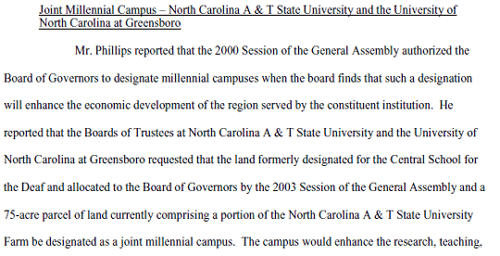 The
Identified JMC
property consisted
of land owned by
the State of North
Carolina
(Approximately 75
acres with 142,000
square feet of
existing space at
the former Central
North Carolina
School for the Deaf
and approximately 75
acres adjacent to
the NCA&T farm)....
which unambiguous
constitute the UNC
Board of Governors
alleged Oct. 10,
2003 designated
NCA&T/UNC-G
Millennial Campus,
emphasis added.
Lease Background
said " This document
has also been
reviewed by the
Office of the
President (Bowles)." The
Identified JMC
property consisted
of land owned by
the State of North
Carolina
(Approximately 75
acres with 142,000
square feet of
existing space at
the former Central
North Carolina
School for the Deaf
and approximately 75
acres adjacent to
the NCA&T farm)....
which unambiguous
constitute the UNC
Board of Governors
alleged Oct. 10,
2003 designated
NCA&T/UNC-G
Millennial Campus,
emphasis added.
Lease Background
said " This document
has also been
reviewed by the
Office of the
President (Bowles)." |
|
|
|
| |
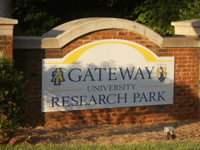 |
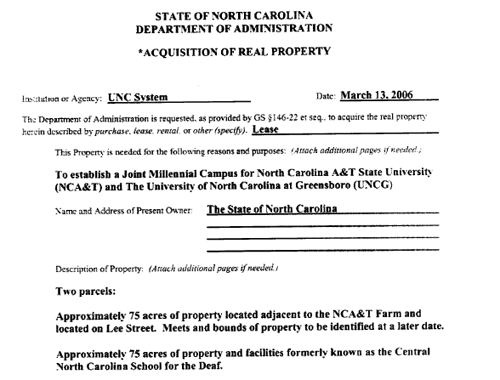 |
|
UNC
System Acquisition of Real
Property by lease P0-1 dated
March 13, 2006 for the
purpose of establishing a
Joint Millennial Campus for
North Carolina A&T |
|
|
State University and The
University of North Carolina
Greensboro. Two parcels:
Approximately 75 acres of
property located adjacent to
the NCA&T farm
and located on Lee Street;
Approximately 75 acres of
property and facilities
formerly known as the
Central North Caroling
School for the Deaf.
Proposed Lease unequivocal
extinguished UNC Board of
Governors alleged Joint
Millennial Campus - North
Carolina A&T State  University
and the University of North
Carolina Greensboro - false
claim Oct. 10, 2003
designation of the Central
School of the Deaf
reallocated to the Board of
Governors and 75-acre parcel
on NCA&T farmland as Joint
Millennial Campus. video University
and the University of North
Carolina Greensboro - false
claim Oct. 10, 2003
designation of the Central
School of the Deaf
reallocated to the Board of
Governors and 75-acre parcel
on NCA&T farmland as Joint
Millennial Campus. video |
|
|
| |
| Email from John
R. Merrill to Terrance Feravich
(UNC-GA) Subject Ground Lease
stated: "Following up on the ground
lease issue for the GCID. I have
downloaded the PO1 from the state
property office and I need to
connect with the attorney's for the
universities to complete the
document (at least to the best of
our ability). I realize we're under
the gun to get this on the April
agenda but what's my deadline.? |
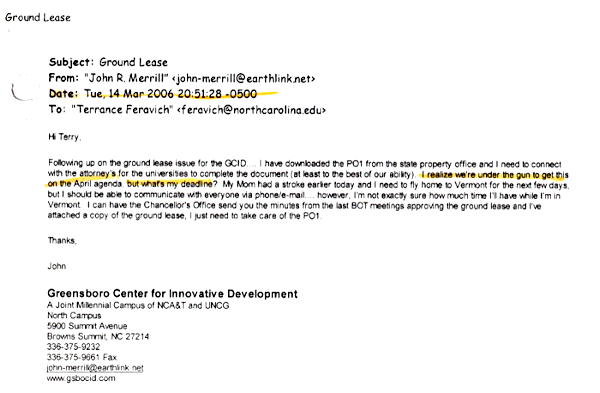 |
| Email from John
R. Merrill to Terrance Feravich
(UNC-GA) Subject Ground Lease
implicate GCID with creation of
P0-1. |
|
|
| |
|
|
|
|
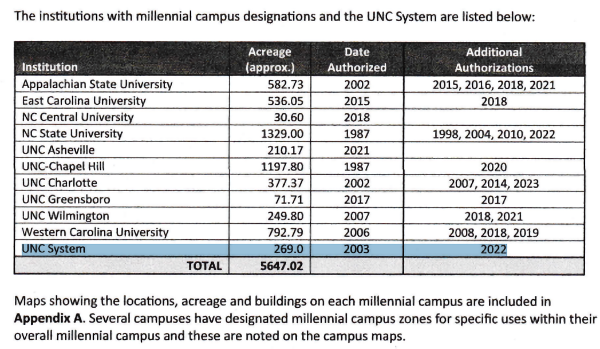 |
| Board of Governors'
document institutions with millennial
campus designations and the UNC System,
indicates UNC System millennial campus authorized in
2003 and 2022 and does
not indicate a NCA&T/UNCG joint
Millennial Campus 2003. |
|
|
| |
|
Expansion of Millennial Campus - The
University of North Carolina System Office May 25, 2020 |
 |
| Issue overview indicate G.S.
116-198.34 grants the Board of Governors authority to
designate real property as a millennial campus. The
University System Office is requesting an expansion of its millennial
campus to include the Spangler Complex... The UNC
System Office previous designated 150 acres as a
millennial campus consisting of Gateway Research
Park-North Campus in Brown Summit, NC and Gateway
Research Park-South Campus in Greensboro, NC. No
provision of NCGS 116-189.34 grants UNC System Office
authority to designate real property as a millennial
campus. |
|
| |
Notwithstanding NCA&T's 2001 Master Plan update calling
for establishing a university Millennial 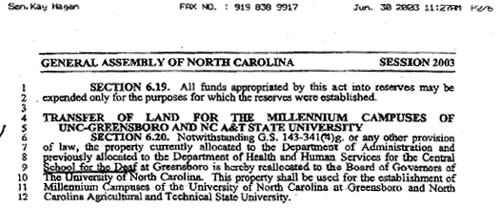 Campus
at the farm, credited in the media as the work of UNC-G
district NC Senator Kay Hagan, June 30, 2003, the
General Assembly, Session Law 2003-294, Section 6.20,
reallocated former Central School of the Deaf from the
State property Office to UNC BOG to be used for the
establishment of Millennium campuses of the University
of North Carolina at Greensboro and North Carolina
Agricultural and Technical State University. Campus
at the farm, credited in the media as the work of UNC-G
district NC Senator Kay Hagan, June 30, 2003, the
General Assembly, Session Law 2003-294, Section 6.20,
reallocated former Central School of the Deaf from the
State property Office to UNC BOG to be used for the
establishment of Millennium campuses of the University
of North Carolina at Greensboro and North Carolina
Agricultural and Technical State University. |
| |
 The
term "Millennial Campus" means all real property and appurtenant
facilities designated
by the Board of Governors as part of a Millennial Campus of
a constituent institution of The University of North Carolina ....
GS 116-198.34(4b). (2000) The
term "Millennial Campus" means all real property and appurtenant
facilities designated
by the Board of Governors as part of a Millennial Campus of
a constituent institution of The University of North Carolina ....
GS 116-198.34(4b). (2000) |
| |
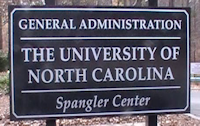 UNC
System Office houses the offices of the president and
senior administrative staff. This core administrative
staff researches, recommends, and executes the
policies of the Board of Governors. UNC
System Office – UNC System (northcarolina.edu).
No provision of NCGS 116-189.34 grants UNC System Office
authority to designate real property as a millennial
campus. UNC
System Office houses the offices of the president and
senior administrative staff. This core administrative
staff researches, recommends, and executes the
policies of the Board of Governors. UNC
System Office – UNC System (northcarolina.edu).
No provision of NCGS 116-189.34 grants UNC System Office
authority to designate real property as a millennial
campus. |
| |
|
|
| |
|
|
|
UNC System Office alleged designate
millennial campus consisting of Gateway
Research Park-North Campus in Brown
Summit, NC and Gateway Research
Park-South Campus in Greensboro, NC.
Unambiguous
no statuary NCGS:
116-198.34. (8b),GS
116-198.33(4b) NC
A&T/ UNCG Joint
Millennial Campus was designated enabling
Greensboro Center for Innovative
Development, Inc. to administer
the educational, research, and economic
development mission of a Joint
Millennial Campus. No
lawful leased was
executed by Board of Governors to the
Greensboro Center for Innovative
Development, Inc.
for NCA&T/UNCG Joint Millennial Campus
consisting of Session Law 2003-284,
Section 6.20, land and facilities and
75-acre parcel of NC A&T Farmland. Link |
|
|
|
| |
|
|
|
 |
|
|
|
May 2007 UNC Board of Governors established
alleged Joint
School of
Nanoscience and Nanoengineering, at de
facto NC
A&T / UNCG Joint Millennial Campus, UNCG
affiliate, Gateway University Research
Park, Inc.; to offer (a) joint
interdisciplinary Ph.D. degree and (a)
joint professional science master's
degree. |
|
|
| |
|
The National Center for Educational
Statistics (NCES) responsible for collecting and
presenting statistical data and information for the
nation; classifies Nanoscience and Nanoengineering as
Nanotechnology CIP 15.1601: Engineering technologies and
Engineering related fields. |
| |
| Nanotechnology
and Biotechnology should have been
NC A&T Signature programs |
| |
HB 1264 (6), says
with regard to the University
System, there shall be special
emphasis on the development of
signature programs for Historically
Black Colleges and Universities and
the University of North Carolina at
Pembroke.
|
|
“Signature programs” have been
defined as those that are
distinctive, that build on
existing strengths,
that advance the
institution’s profile, and that
serve regional and/or state economic
transformation needs." |
| |
“Expertise in nanotechnology may
become a prerequisite for many
scientists and engineers that
support a wide variety of
industries, nano expertise among the
North Carolina science and
engineering workforce may soon
become a competitive advantage issue
for the state. [PCG/UNC-NCCCS/UNC
Interim report
3.doc/RB.SP.PC.CR.ATPCC.1/CC.14/10May05
Page 34 ]
|
|
"It is
predicted that nano scale science
will change the nature of almost
every human-made product this
century. This field has great
potential applications in materials,
medicine, electronics, optics, data
storage, advanced manufacturing,
environment, energy, and national
security. PCG/UNC-NCCS/UNC
Interim report3. doc/RB.SP.PC.CR.Atpcc.I
/CC.14/10May05 page 109] |
|
| |
|
|
|
|
|
| |
|
A&T
Awarded NSF Engineering
Research Center |
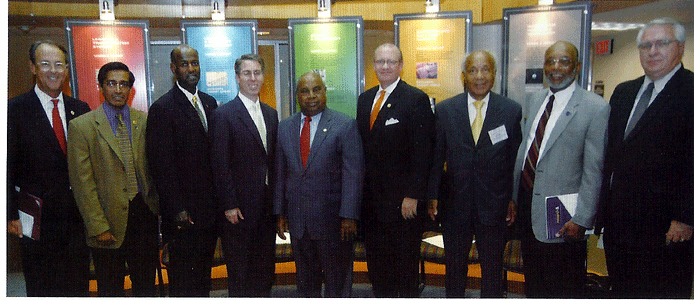 |
NCA&T State University
has been funded at an
average rate of $3-5
million per 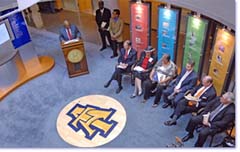 year
in the area of
nanoscience and
nanotechnology. Most of
the research in
nanoengineering is done
in the Center
for Advanced Materials
and Smart Structures (CAMSS).
Several Centers and
projects are under CAMSS,
including the NSF Center
for Research Excellence
in Science and
Technology (CREST), the
DoD Center for
Nanoscience, Nanomaterials
and Multifunctional
Materials (CNN) for
Homeland Security, the
NSF Nanoscale Science
and Engineering Center (NSEC),
the NSF project on
US/Europe Materials
Collaboration:
Self-Organized
Nanostructured Thin
Films for Catalysis, the
NSF project on Nanoscale
Interdisciplinary
Research Teams (NIRT),
the NSF Major Research
Instrumentation for
Nanoengineering
Research, and the NSF
Nanotechnology
Undergraduate Education
(NUE) program. CAMSS
also facilitates many of
the materials research
activities of the
NASA-National Institute
for Aerospace (NIA). In
addition, the Center for
Composite Materials
Research (CCMR) does
research in
nano-enhanced composite
materials and the Army
Center of Excellence for
Battlefield Capability
Enhancements (Flexible
Displays) does research
in material
characterization and
development of novel
displays. UNC
Greensboro:
A Center for Research
Excellence in
Nanobiosciences in the
process of being
established.
[5] Photo N.C. year
in the area of
nanoscience and
nanotechnology. Most of
the research in
nanoengineering is done
in the Center
for Advanced Materials
and Smart Structures (CAMSS).
Several Centers and
projects are under CAMSS,
including the NSF Center
for Research Excellence
in Science and
Technology (CREST), the
DoD Center for
Nanoscience, Nanomaterials
and Multifunctional
Materials (CNN) for
Homeland Security, the
NSF Nanoscale Science
and Engineering Center (NSEC),
the NSF project on
US/Europe Materials
Collaboration:
Self-Organized
Nanostructured Thin
Films for Catalysis, the
NSF project on Nanoscale
Interdisciplinary
Research Teams (NIRT),
the NSF Major Research
Instrumentation for
Nanoengineering
Research, and the NSF
Nanotechnology
Undergraduate Education
(NUE) program. CAMSS
also facilitates many of
the materials research
activities of the
NASA-National Institute
for Aerospace (NIA). In
addition, the Center for
Composite Materials
Research (CCMR) does
research in
nano-enhanced composite
materials and the Army
Center of Excellence for
Battlefield Capability
Enhancements (Flexible
Displays) does research
in material
characterization and
development of novel
displays. UNC
Greensboro:
A Center for Research
Excellence in
Nanobiosciences in the
process of being
established.
[5] Photo N.C. |
|
|
|
| |
|
|
Education and Skill
Requirements
Almost all of the occupations which will be
affected by nanotechnology will require a BS in
engineering with a broad, interdisciplinary and
multi-disciplinary approach. Nanotechnology will
require an understanding not only of electrical,
mechanical and civil engineering, but biology,
physics and chemistry as well. |
 |
|
PCG/UNC-NCCCS/UNC
Interim report
3.doc/RB.SP.PC.CR.ATPCC.1/CC.14/10May05 |
|
| |
| University of North Carolina
at Greensboro 2008-2009 Profile doctoral
degrees were awarded in English; Psychology;
Education; Counseling; Human Development and
Family studies; Exercise and Sport Science;
Curriculum and Teaching; Consumer, apparel, and
Retail Studies; and Music. |
|
 |
|
University of North Carolina at Greensboro
2008-2009 Profile |
|
| |
| Historical black
North Carolina A&T, as one of the
state's two land grant institutions,
has programs through the doctoral
level. Its programs include
engineering, arts and sciences,
agricultural and environmental
sciences, business and economics,
education, nursing, technology, and
graduates studies. “The expected
roles of a land-grant institution,
is teaching agriculture and
engineering, and providing
cooperative extension services” . |
 |
|
|
| |
|
UNC Board
of Governors January
2007 authorized UNC
Charlotte, which has an
Engineering School, to
offer a Ph.D. in
Nanoscale Science.
Offering Nanoscale
Science was not a
Substantial Change as
defined by the SACS for
UNC Charlotte. Nov.
2012 UNC Board of
Governors authorized a
Master’s in
Nanoengineering to Land
Grant Institution NC
State, which has an
Engineering. Offering
Nanoengineering was not
a Substantial Change as
defined by the SACS for
NC State.
Consistent with other
engineering schools in
the UNC System offering
Nanoscience and
Nanoengineering
(Material Science)
programs are
not Substantial Changes
as defined by the SACS
and consistent
with the education,
curricular, mission and
goals of NC A&T State
University. No liberal
arts school offered
Nanotechnology degrees
in the UNC System |
|
| |
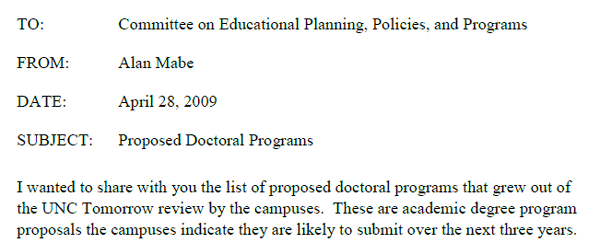 |
 |
| Dr. Alan Mabe Senor Vice President for Academic Affairs April 28, 2009 to Ed Planning, Ph.D. Memorandum degree proposals indicate NC A&T plan to offer Nanoscience and Material Science (Nanoengineering). |
|
|
|
|
| |
UNC Greensboro Nanoscience degrees
requires access to NC A&T academic
programs and research: “Although
the degree is in Nanoscience (does
not include Nanoengineering)

students will be given the
opportunity to take relevant courses
at the School of Engineering at
North Carolina A&T University and
must be able to work on
collaborative projects with faculty
in the School of Engineering. |
| |
|
Unlike land grant
cross-town historical Black NCA&T
with strong programs in engineering
offering Nanoscience constituted a
Substantive Change as defined by
SACS from previous approved circular
at historical white women UNC
Greensboro Liberal Arts with
nursing and music programs .
(UNCG) Rebecca Adams to (SACS) Tom
Benberg: Sarah Armstrong Subject:
Request for interpretation of
accuracy of nanoscience message,
April 13, 2010:
The bottom line,
however, is that we need to submit a
full prospectus and need to do so as
soon as possible. This request will
be for approval to initiate a new
off-campus site (South Campus) and
to initiate a new degree program (MS
in Nanoscience) at that site. Contrary
to previous interpretations, both
represent substantive changes..
Due to the confusion, they are
willing to waive the requirement
that we do so 6 months in advance
and will usher it though the
approval process in a timely way so
that we can accept students into
UNCG's MS in Nanoscience program
next fall. Emphasis added |
|
| |
|
| |
 |
|
The degree authorization process progression
calls for a constituent institutions to
submit Request to Establish a New Degree to
UNC System General Administration which
serves under the President. The General
Administration submits constituents request
to Planning Committee. If the Planning
Committee approved the Request it is taken
to the full Board of Governors for a
decision to authorized. |
|
| |
|
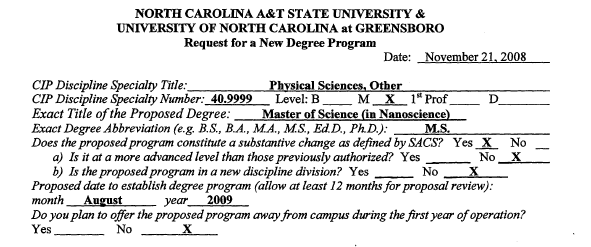 |
|
NC
A&T/UNCG submitted Joint Request for
authorization to Establish” Ph.D. in
Nanoscience” dated Oct. 10, 2008 to UNC General
Administration and Joint Request for
authorization to establish “Master of Sci |
|
| |
UNC Policy for Interdisciplinary
Degree

An Interdisciplinary Degree program involves two or more
academic units, either on the same or
different campuses in a formal agreement to offer a
program of study drawing on two or more disciplines that
will result in a student being awarded an
interdisciplinary degree. If more than one campus is
involved in offering the program it would also be a
joint degrees. |
| |
United States v. Fordice, 505 U.S. 717
(1992) a United States Supreme Court case that resulted
in an eight to one ruling that the eight public
universities in Mississippi had not sufficiently
integrated and that the state must take affirmative
action to change this under the Equal Protection Clause
and Title VI. This is not a legal setting but
context comparison UNC BOG & SOCS policies in light
of the selected text held in UNITED STATES v. FORDICE,
GOVERNOR OF MISSISSIPPI :
..If the State perpetuates policies and
practices traceable to its prior de jure dual system
that continue to have segregative effects ...implicit in
the court’s finding of “unnecessary” duplication is the
absence of any educational justification ....and such
policies are without sound educational justification and
can be practicably eliminated, implicated the Equal
Protection clause... , emphasis added.
Clearly
unnecessary duplication take place when across-town
Liberal Art UNC Greensboro with programs in music and
nursing, requiring relevant courses be taken at the
School of Engineering at North Carolina A&T University
and will be able to work on collaborative projects with
faculty in the School of Engineering”, except for
unvarnished racism offering Nanotechnology degrees? |
|
|
|
|
| |
|
Contractual
Agreement –
typically is one in which an
institution enters an agreement
for receipt of courses/programs
or portions of courses or
programs (i.e., clinical
training internships, etc.)
delivered by another institution
or service provider.
[SUBSTANTIVE CHANGE FOR SACSCOC
ACCREDITED INSTITUTIONS Policy
Statement]. Therefore a Contractor,
institution or service provider enters
into an agreement to provide
courses/programs or portions of
courses or program |
|
| |
|
|
|
| |
|
|
| |
|
 |
|
JSNN
Management Agreement March 3, 2008: Article
5. Degrees.
Degrees will be awarded jointly NCA&T and
UNCG; Article
1: Mission and Organizing Principles.
NCA&T and UNCG are committed to the principle
that the JSNN is a shared academic unit of the
two institution in terms of governance, faculty,
students, curriculum,
and management; constitute Collaborative
academic arrangements are agreements between
institutions purposes of awarding academic
credits and/or educational program completion
credentials, e.g., certificates, diplomas,
degrees or transcripts. |
| |
|
NCA&T Chancellor Battle and UNCG
Chancellor Sullivan signed JSNN Management
Agreement dated March 3, 2008 :
· Mission:
offer joint interdisciplinary Ph.D. degree and
joint professional master’s degrees (M.S.)
Nanoscience,
· Organizing
Principle:
That NCA&T and UNCG are committed to the
principle that the JSNN is a shared academic
unit in terms of governance, faculty, students, curriculum, and
management. Emphasis added.
· Article
5 Curriculum/Degrees: Degrees
will be awarded jointly by NCA&T
and UNCG |
| JSNN March 3, 2008 Management
Agreement Organizing Principles North Carolina
A&State University and the University of North
Carolina at Greensboro are committed to the
principle of a shared academic unit of the two
institutions in terms of governance, faculty,
students, curriculum, and management.
JSNN shared academic in terms of curriculum
constituted agreement
for receipt of courses/programs or portions of
courses or programs |
|
| |
In letter dated November
20, 2008 to
Dr. Beele Wheelan, President Commission on Colleges,
SACS allegedly by Alton Thompson (NC A&T) and David
Perrin (UNCG) stated; we would greatly appreciate
receiving your guidance regarding the next steps for
seeking SACS-COC authorization
for JSNN,
it respective degree programs, and affiliated
activities. Emphasis added
The intent of the school is be become a
world-class education and technical institution and also
to become an engine for economic growth in the Triad and
North Carolina as a whole. Emphasis
added
A Professional Master of Science in
Nanoscience degree and a Ph.D. in Nanoscience degree are
not in the review process by A&T and UNCG.
The facility will be located on the South
Joint Millennium Campus ( on land that was originally
part of the NC A&T farm), established as part of the
Greensboro Center for Innovative Development, a
collaborative initiative between the two universities. |
| |
| Ginger Burks ,email, Mon, 27
Oct 2008 Subject Joint Nano discussion on
Tuesday to Mabe, Harold Martin, Rob Nelson CC
Lisa Adamson. Hi everyone , We scheduled to
discuss the Joint Nanoscience and
Nanoengineering proposal Tuesday. I've attached
the latest version of the documents for your
review. Perhaps we can modify these to denote
our agreement on all these topics and then send
to the campuses for final sign off so that funds
can be released. Clearly we we can modify
these to denote our agreement on all these
topics and then send to the campuses for final
sign off , indicate the administration wrote the
management agreement. |
|
 |
|
| |
 Harold
Martin, Rob Nelson, Alan Mabe, email dated
December 09, 2008, Subject Joint Millennial
Campus to: Provosts Perrin and Thompson UNCG
and NCA&TSU , attachment Second
Document Page 9 UNC GA/Questions from UNC
General Administration’s notes
the March 3, 2008 Memorandum (Management
Agreement) needs to be revised, updated and
reapproved. Harold
Martin, Rob Nelson, Alan Mabe, email dated
December 09, 2008, Subject Joint Millennial
Campus to: Provosts Perrin and Thompson UNCG
and NCA&TSU , attachment Second
Document Page 9 UNC GA/Questions from UNC
General Administration’s notes
the March 3, 2008 Memorandum (Management
Agreement) needs to be revised, updated and
reapproved. |
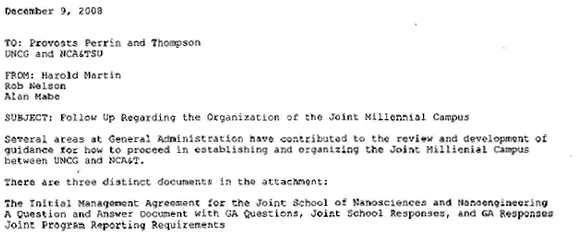 |
 |
| |
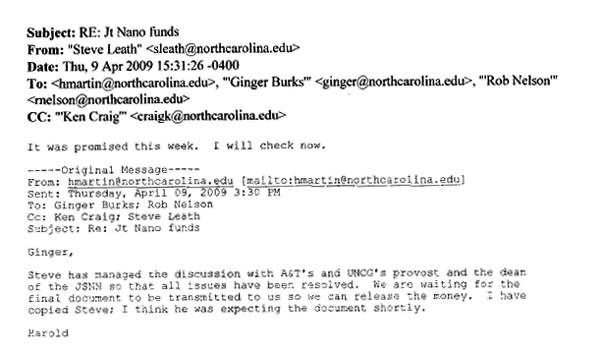 |
|
“Steve has managed the
discussion with A&T's and UNC-G's
provost and the dean of the JSNN so that
all issues have been resolved." said Dr.
Harold Martin, Sr. (Email April 9). |
|
|
| |
Reported in the
media: UNC-Greensboro
Board of Trustees Nov. 2, 2006,
approved budget request part of a
19-page proposal outlining plans for
the nanotech program scheduled to go
before trustees at A&T Nov. 15. The
school, as it is proposed, would
offer a doctorate in Nanoscience and
Nanoengineering and a professional
science master's program, emphasis
added. Officials from both
A&T and UNC-G
 declined
to comment on the proposal because
it had not yet been presented to the
A&T trustees. It must be approved
by both schools before it can be
submitted to the UNC General
Administration for evaluation. “ [5]
. The College [College of Arts and
Sciences] was a central player in
the continuing work to establish the
Joint School of Nanoscience and
Nanoengineering with NC A&T
University. Degrees or programs
being considered for the future· MS
in Nanoscience and Ph.D. in
Nanoscience. [UNC-G Curricular
Planning, Academic Affairs Annual
Report AY 2007/08] declined
to comment on the proposal because
it had not yet been presented to the
A&T trustees. It must be approved
by both schools before it can be
submitted to the UNC General
Administration for evaluation. “ [5]
. The College [College of Arts and
Sciences] was a central player in
the continuing work to establish the
Joint School of Nanoscience and
Nanoengineering with NC A&T
University. Degrees or programs
being considered for the future· MS
in Nanoscience and Ph.D. in
Nanoscience. [UNC-G Curricular
Planning, Academic Affairs Annual
Report AY 2007/08] |
|
| |
| Dr. Belle
S. Wheelan, Ph.D. President
Commission on Colleges
Letter dated March 17,
2009 Address to Dr.
Alton Thompson, Interim
Provost and Vice Chancellor
for Academic Affairs and Dr.
David H. Perrin, Provost and
Vice Chancellor for Academic
Affairs University of North
Carolina Greensboro said
pardon my delay in
responding to your letter of
November 20, 2008 in which
you notified the Commission
of your intent to establish
the Joint School of
Nanoscience and
Nanoengineering (JSNN).
emphasis added. |
 |
| In
addition to research, you
anticipate offering the
Professional Master of
Science in Nanoscience and
the Ph.D. in Nanoscience
degree programs. In addition
to a joint prospectus,
please submit a joint
document demonstrating your
compliance with the
Commission policy and
guideline, Joint Curricular
Ventures Involving the Award
of Credit by Member
Institutions. |
|
|
|
|
| |
 |
| |
Erskine Bowls UNC General Administration, approved Amended and Restated Management Agreement (April 2009) in part altered JSNN March 03, 206 Management Agreement Mission from offering joint interdisciplinary Ph.D. degree and joint professional science master's degrees; to offering (stand-alone) interdisciplinary Master of Science and Ph.D. degrees and a Professional Master of Science in Nanoscience degree, an unauthorized change in mission. |
| |
 |
| Organizing Principles. NCA&T and UNCG are committed to the principle that the JSNN is a shared academic unit of the two institutions in terms of governance and management -explicitly - removing shared academic unit. UNCG will be the home institution for nanoscience faculty, students and the nanoscience curriculum and degree programs. .NC A&T will be the home institution for nanoengineering faculty, students and the nanoengineering curriculum and degree programs |
|
|
|
|
|
|
|
| |
Erskine Bowls
UNC General
Administration,
approved Amended
and Restated
Management
Agreement (April
2009) in part
altered JSNN
March 03, 206
Management
Agreement
Mission from
offering joint
interdisciplinary
Ph.D. degree and
joint
professional
science master's
degrees; to
offering
(stand-alone)
interdisciplinary
Master of
Science and
Ph.D. degrees
and a
Professional
Master of
Science in
Nanoscience
degree, an
unauthorized
change in
mission. |
| |
 |
|
Organizing
Principles. NCA&T
and UNCG are
committed to the
principle that
the JSNN is a
shared academic
unit of the two
institutions in
terms of
governance and
management
-explicitly -
removing shared
academic unit. UNCG
will be the home
institution for
nanoscience
faculty,
students and the
nanoscience
curriculum and
degree programs.
.NC A&T will be
the home
institution for
nanoengineering
faculty,
students and the
nanoengineering
curriculum and
degree programs |
|
|
|
| |
|
NC A&T Chancellor Dr. Stanley Battle
resigned effective June 30, 2009. Dr. Harold
Martin became the next chancellor at NC A&T
July 2009. |
|
|
| |
|
|
| |
|
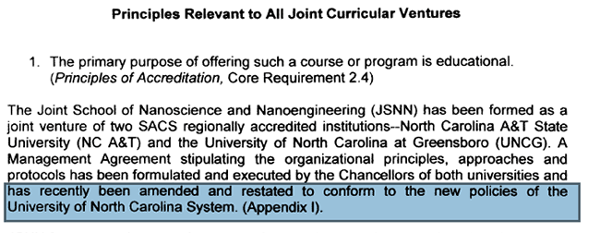 |
 |
| Principles
Relevant to All Joint Curricular
Ventures (1.) A Management
Agreement stipulating the
organizational principles,
approaches and protocols has
been formulated and executed by
the Chancellors of both
universities and had recently
been amended and restated to
conform to the new policies of
the University of North Carolina
System. (Appendix1). |
| |
| |
 |
|
3.
Principles of Accreditation,
Comprehensive Standard 3.4.6 |
| |
|
Principles Relevant to All Joint
Curricular Ventures (3.), The
Joint school of Nanoscience and
Nanoengineering (JSNN) has been
formed as a joint venture of two
regionally accredited
institutions. The General
Administration of the University
of North Carolina system
approved the formation of the
school. The amended and
restated JSNN management
agreement is attached to this
document (Appendix 1). When
approval is received from the
UNC System, the faculty
approval of the degree programs
and courses will then follow the
procedures outlined in the
faculty handbooks at the
respective campus clear
indicate the General
Administration of the University
of North Carolina system JSNN
was not approved by UNC System /
Board of Governors. |
| |
| Dr.
Alton Thompson, Interim
Provost and Vice
Chancellor for Academic
Affairs and Dr. David H.
Perrin, Provost and Vice
Chancellor for Academic
Affairs University of
North Carolina
Greensboro, in letter
dated August 5, 2009 to
Dr. Belle Wheelan said
this letter is in
response to your letter
dated March 17, 2009. |
| |
|
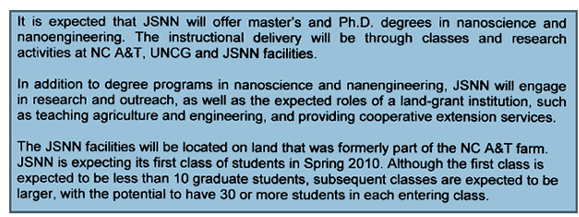 |
| |
|
Enclosure Principles
Relevant to All Joint
curricular Ventures (1.)
says In addition to
degree programs in
nanoscience and
nanoengineering, JSNN
will engage in research
and outreach, as well as
the expected roles of a
land-grant institution,
such as teaching
agriculture and
engineering, and
providing cooperative
extension services. |
|
| |
|
 |
|
University of North
Carolina at Greensboro
2008-2009 Profile |
|
| |
 |
| Amended and
Restated Management Agreement
says all references to "JSNN
faculty, Nanoengineering faculty
and Nanoscience faculty in this
document refer to faculty
members hired by JSNN to carry
out their primary research and
academic duties in JSNN.
"Nanoengineering faculty are
faculty members hired by JSNN
with NC A&T as their home
institution. Nanoscience faculty
are faculty members hired by
JSNN with UNCG as their home
institution. |
|
|
| |
 |
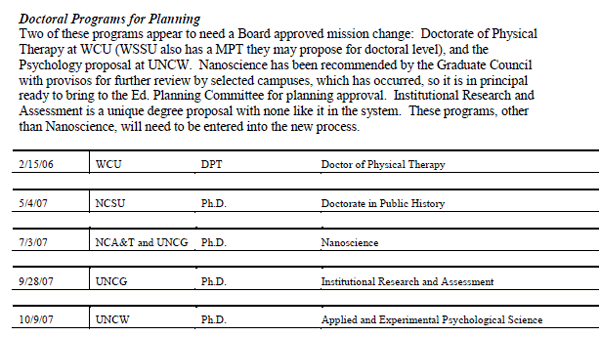 |
|
NC A&T and UNCG
submitted Request for
Authorization to
Establish a New Degree
Program , Ph.D. in
Nanoscience dated
October 10, 2008 and
Master of Science in
Nanoscience dated
November 21, 2008 to UNC
General Administration,
CIP discipline
40.999. Two
programs with the same
CIP code should
initially be viewed as
duplicative. [UNIVERSITY
OF NORTH CAROLINA PRO |
| |
|
UNC Vice
President of
Academic
Development Dr
Alan Mabe June
3, 2008 notified
the Committee on
Educational
Planning,
Policies, and
Programs that
UNC GA paused
bringing new
degree proposals
to the Committee
while the New
Academic
Program policy
was being
developed. Among
doctorial
programs that
would continue
pursuant
existing policy
was NCA&T and
UNCG Ph.D.
Nanoscience. |
|
|
|
|
| |
|
|
| |
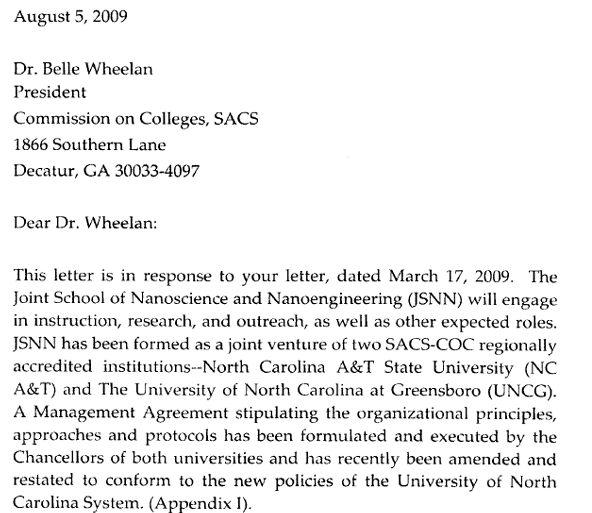 |
 |
|
Alleged, NC A&T Dr.
Alton Thompson, Interim Provost and
Vice Chancellor for Academic Affairs
and UNCG Dr. David H. Perrin,
Provost and Vice Chancellor for
Academic Affairs, in letter
dated August 5, 2009 to Dr. Belle
Wheelan enclosure stated a
management stipulating the
organizational principles,
approaches and protocols has been
formulated and executed by
Chancellor of both universities and
has recently been amended and
restated to conform to the new
policies of the University of North
Carolina System (Appendix 1).
Appendix 1 is Amended and Restated
Management Agreement April 2009.
Article 5. Curriculum/Degrees
Degrees. Nanoengineering degrees
will be awarded by NC A&T.
Nanoscience degrees will be awarded
by UNCG. |
| |
|
CODE 301C. The
Committee on
Educational
Planning,
Policies, and
Programs shall
receive the
advice and
recommendations
of the president
and make
recommendations
to the board in
all areas
pertaining to
the development
of a coordinated
system of higher
education in
North Carolina,
including: (a)
the definition
of mission and
assignment of
functions of
each constituent
institution; (b)
the review of
requests for the
initiation of
new degree
programs and
recommendations
for the
termination of
existing
programs [SECTION
301. THE
STANDING
COMMITTEES’
JURISDICTION] |
|
|
|
|
| |
|
Memorandum to Chief Academic
Officers from Alan Mabe and Jim Sadler, Subject
Restating the Academic program Planning and
Evaluation Process dated September 21, 2009
proposed schedule for Wednesday, Oct. 7, 2009
included entry NCA&TSU and UNCG [joint] M.S. in
Nanoscience CIP 40.999). |
 |
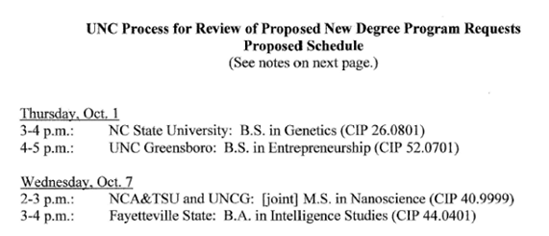 |
|
Alan Mabe Memorandum dated September 21, 2009 to
Chief Academic Officers Subject: Restarting the
Academic Program Planning and Evaluation
Process, Proposed new degree Program Requests
Proposed Schedule listed Wednesday, Oct. 7, 2-3
p.m.: NCA&T SU and UNCG: [joint] M.S. in
Nanoscience (CIP 40.999}, clearly indicated UNC
System/ BOG had
not approved UNC System General Administration
Joint School of Nanoscience and Nanoengineering circular/
degrees Nanoengineering degrees will be awarded
by NC A&T. Nanoscience degrees will be awarded
by UNCG. |
| |
|
Unambiguous Alan Mabe and Jim
Sadler Memorandum revised degree planning and
authorization should continue, NCA&TSU and UNCG
(joint) M.S. in Nanoscience Wednesday Oct. 7,
was evidence August 5, 2009 letter to Dr.
Wheelan allege approaches and protocols
(Appendix I) were not amended and restated to
conform to the new policies of the University of
North Carolina System. (Appendix I). |
| |
| The
suspension of taking new programs to the
committee on Educational Planning , the first
step in development of new policies for the
University of North Carolina System. Unambiguous
taking new programs to Committee on Educational
Planning which (a) define the mission and
assignment of functions was suspended between
June 3, 2008 and September 21, 2009 , therefore,
allegations management agreement stipulating the
organizational principles, approaches and
protocols has been formulated and executed by
Chancellor of both universities and has recently
been amended and restated to conform to the new
policies of the University of North Carolina
System (Appendix 1) was false. |
| |
|
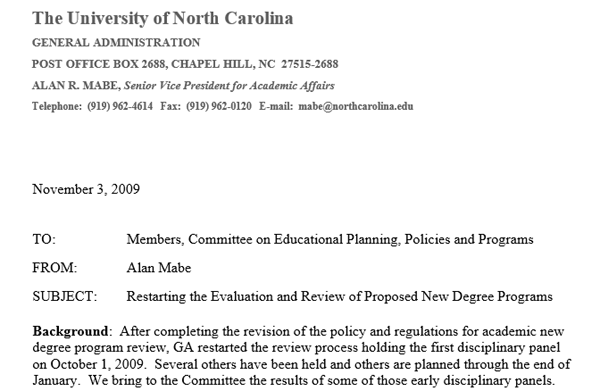 |
|
 |
|
 |
| Dr. Alan Mabe,
Senior Vice President for Academic
Affair memorandum to Members,
Committee on Education Planning,
Policies and Programs, dated
November 3, 2009, Subject: restating
the Evaluation and Review of
Proposes New Degree background
indicate: |
| |
|
Received |
Institution |
Degree |
CIP |
Established |
| 1/29/09 |
NCA&T |
M.S. |
40.9999 |
Nanoscience (Joint with
UNCG) |
| |
|
|
|
Authorization to Establish |
| 11/14/08 |
NCA&T
(UNCG) |
PhD. |
40.9999 |
Nanoscience |
|
| |
|
|
|
| |
|
Reported in the Media: "UNCG
and N.C. A&T are partners in the project.
UNCG is offering graduate degrees in
Nanoscience. A&T will eventually offer
degrees in Nanoengineering."[11] |
| |
|
|
|
|
| |
|
UNC Board of Governors
Minutes May 2006 |
|
|
|
|
| The North Carolina A&T State
University and the UNC Greensboro Joint School
of Nanoscience and Nanoengineering. Dr.
Priscilla P. Taylor (Cemala
Foundation) reported that the Greensboro and
greater Triad community are solidly behind this
proposal and see it as an important step that
will have significant impact on economic
development in the region. The master's and
doctoral degree programs will follow the
ordinary approval process and will be separately
considered by the committee. |
|
| |
|
The UNC Policy Manual 400.1.1.1[G]
Adopted 05/06/09 |
 |
| |
|
Examining Nanoscience
discipline file at www.northcarolina.edu : |
 |
 |
|
1. The
discipline file contained no UNCG
Notification to plan a master’s in
Nanoscience,
2. The
discipline file contained an unsigned “Revised
UNCG Request to Establish a Master’s in
Nanoscience,
3. The
discipline file contained no UNCG
Request to plan a PhD in Nanoscience
4. The
discipline file contained no UNCG
Request to Established a PhD in
Nanoscience |
|
| |
|
|
| |
|
The Chancellor signature
certifies proposal [UNC Policy Manual
400.1.5(G)] to establish new degree program
was reviewed and approved by the appropriate
campus committees and authorities. |
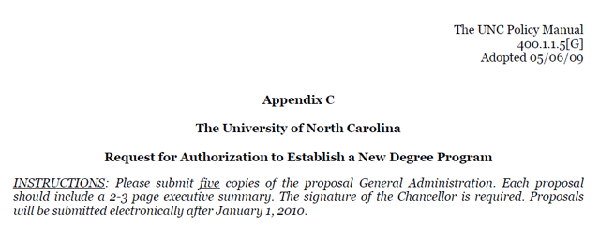 |
|
| |
|
NCAT/UNCG Joint PhD in Nanoscience |
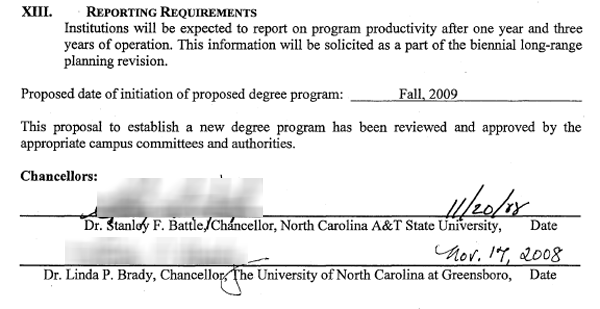 |
|
| |
|
Responding to a Public
records request to Dr. David H. Perrin UNCG
Provost & Executive Vice Chancellor,1/7/11,
for a copy of an UNCG chancellor signed
request to establish stand alone Masters and
PhD Nanoscience degrees at UNCG, Counsel
Steve Serck responded "In
response to your request of 1/7/11, no such
documents as you described exists." |
| |
|
Unambiguous
lack of UNCG Chancellor
Dr. Linda Brady signed Proposals requesting
to establish Nanoscience Professional Master
of Science in Nanoscience and Ph.D.
Nanoscience clearly demonstrated UNCG had
not expressed intentions to establish
the degrees, they had not been approved by
the faculty and administration, and were not
pursuant UNC Policies 400.1.1,1[G]and
400.1.1.5[G]. |
|
| |
|
Requests to UNC-GA for a UNCG
Request to Plan a PhD and Request to
Establish a standalone PhD in Nanoscience
proscribed by UNC Guidelines for Academic
Program Development subsection (B) related
to degree authorization Ms. Joni
Worthington (UNC-GA) Vice President for
Communications UNC General Administration
responded to a public record request for a
UNCG Chancellor signed request to plan and
establish a PhD in Nanoscience said: “Dr.
Alan Mabe in his capacity as Senior Vice
President for Academic Affairs determined:
· UNCG
was not required to submit a new request to
plan a Ph.D. in Nanoscience. The joint
proposal submitted by UNCG and NCA&T was
deemed sufficient for the campus to move
forward with planning a stand-alone degree
program.
· UNCG
was not required to submit a new request to
establish a Ph.D. in Nanoscience. The joint
request submitted by UNCG and NCA&T, which
had already been recommended for approval by
the UNC Graduate Council, was deemed
sufficient for Board consideration. The
Board of Governors concurred with that
determination in approving the establishment
of the program. (E-mail 10.08. 2010) “ |
| |
|
| |
|
The President [shall]
promulgate regulations to
implement Board of Governors
Policy.
|
|
 |
|
Policy on Academic Program
Planning The UNC Policy
Manual 400.1 Adopted |
| |
|
 |
|
Contradicting
assertions Dr. Mabe in the capacity
of Senior VP for Academic Affairs
etc., are Board approved
Guidelines for Academic Program
Development subsection (B.)
Academic Program Development
Requiring Authorization or Action
Beyond the Campus Level, which says
The chancellors of the constituent
institutions shall communicate to
General Administration of the
University their intentions or
requests with respect to
instructional program development
for Request for authorization to
plan a new degree program at the
doctoral or first professional level
and Request for authorization to
establish a new degree program.
[Guidelines for Academic Program
Development [The UNC Policy Manual
400.1.1.1[G] Adopted 05/06/09 |
|
|
|
| |
|
Early in the
investigation of lack of
supporting documentation
for UNCG Nanoscience
degree authorizations
Dr. James Sadler
Associate Vice President
for Academic Planning
University of North
Carolina put forth a
chronology of
authorizations (e-mail
(08/04/2010). |
| |
May 11, 2007
Board of Governors
authorizes establishment
of the Joint School of
Nanoscience and
Nanoengineering. You
ask about any request to
amend the Joint School,
but I am not aware of
any request, emphasis
added. Sadler's reply
indicated JSNN Mission
had not change to add
Nanoengineering degrees. |
| |
|
Dr.
Sadler Chronology
acknowledged unsigned alleged
“Revised UNCG Request to
Establish a Master’s in
Nanoscience dated Nov.
9, 2009 was JSNN Dean
Jim Ryan; |
|
| |
|
From: James C.
Sadler < >
Date: Sun, Oct 11, 2009 at 10:07 AM
Subject: Re: Revised version of the
Request to Establish the
Professional Master of Science in
Nanoscience degree program
To: James Ryan <j>
Cc: dhprrin@uncg.edu,
James C Petersen JCPETERS < >, altont@ncat.edu, kmurray@ncat.edu
Thanks, Jim. I'll confer with Alan
about the Ph.D. and whether anything
is needed. Jim Sadler
James Ryan wrote:
Jim,
I have attached a revised version of
the Request to Establish for the
Professional Master of Science in
Nanoscience. I have included the
most recent update of the JSNN
Management Agreement as well as
revised figures on enrollment. I
have also provided additional
explanation to address questions
that were asked during the
disciplinary committee review on
Wednesday. Please review and let me
know if additional information or
clarification is needed.
Also, similar revisions are needed
for the Request to Establish the
Ph.D. in Nanoscience. Should I send
the latest version of that document
to you as well? Thank you.
Jim
James C. Sadler,
Ph.D. Associate Vice President,
Academic Planning
Interim Assoc. VP, Institutional
Research & Analysis UNC General
Administration |
|
| |
|
JSNN Management
Agreement March 2008 |
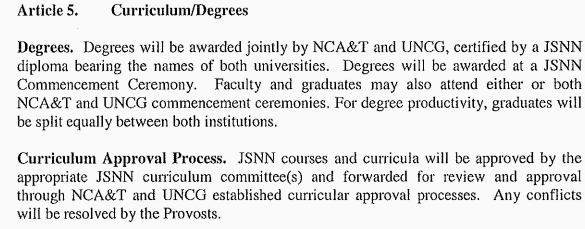 |
|
Curriculum Approval
Process. JSNN
courses and
curricula will be
approved by the
appropriate JSNN
curriculum committee
(s) and forwarded
for review and
approval through
NCA&T and UNCG
established
curricular approval
processes. Any
conflicts will be
resolved by the
Provosts. |
|
| |
|
Amended and
Restated Management Agreement |
|
 |
|
| |
| Pursuant Amended and
Restated Management Agreement curriculum
approval Process JSNN Dean Ryan alleged
UNC Greensboro Revised Request to
establish Nanoscience MS should have
been submitted to UNC Greensboro for
review and approval through established
curricular approval process, not
submitted directly to UNC General
Administration therefore unauthorized. |
|
|
| |
November 13, 2009
UNC Board of Governors
authorizes the UNCG MS in
Nanoscience based on the revised
request submitted. The summary
that went to the Board can be
viewed in the Planning Committee
pre-meeting materials at this
location: https://www.northcarolina.edu/bog/index.php. |
| |
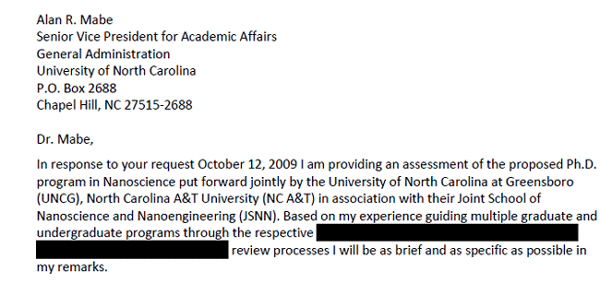 |
| |
 |
| |
 |
| |
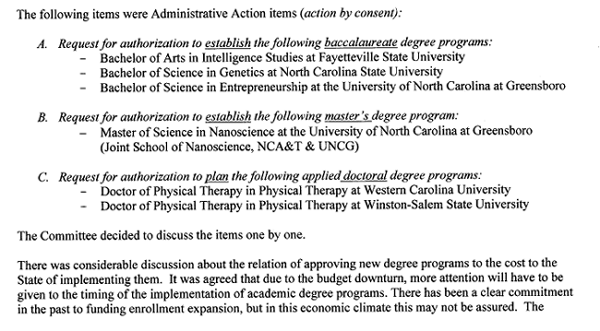 |
 |
|
| |
|
| |
January 8, 2010
UNC Board of Governors
authorizes the UNCG PhD
in Nanoscience based on
the revised request
submitted. The summary
that went to the Board
can be viewed in the
Planning Committee
pre-meeting materials at
this location: https://www.northcarolina.edu/bog/index.php. |
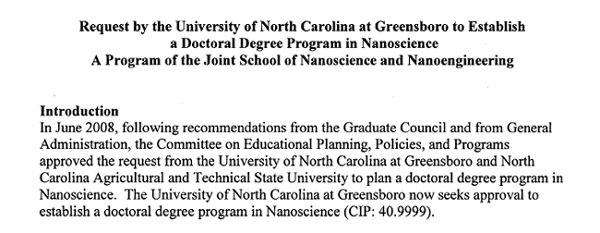 |
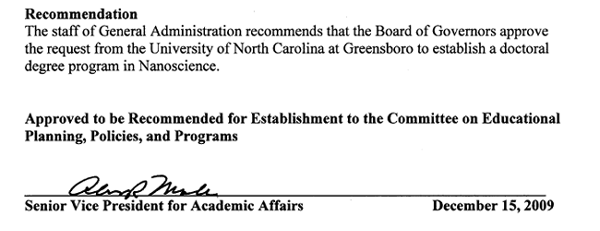 |
 |
|
|
|
|
| |
|
|
|
Notwithstanding the National Center
for Educational Statistics (NCES),
categorized Nanoscience as CIP
15.1601 Engineering Technologies and
Engineering-Related Fields. UNC
General Administration applied CIP
40.9999 (Physical Science) to UNCG
academic offering . Note
UNC-G has a School of Arts and
Science. |
 |
| Note Fall
2005 UNC Presidency transition from President
Molly Broad to
Erskine Bowles. |
| |
Professional Master of Science in
Nanoscience
The 33-hour, non-thesis MS in
Nanoscience follows the Professional
Master of Science degree model,
featuring course work in Nanoscience
and business and an internship to
provide practical experience. |
| |
 |
UNC General Administration applied CIP
40.9999 (Physical Science) to UNCG
academic offering determined
UNC at Greensboro offered only
a Master in Chemistry on the
graduate level in the category of
Physical Science. |
| |
 |
|
| |
|
Erskine Bowles UNC
General Administration
categorizing Nanoscience Ph.D.
as a Physical Science; examining
UNC Greensboro curricula for
similar Physical Science Ph.D. programs
determined: |
|
|
|
|
|
| |
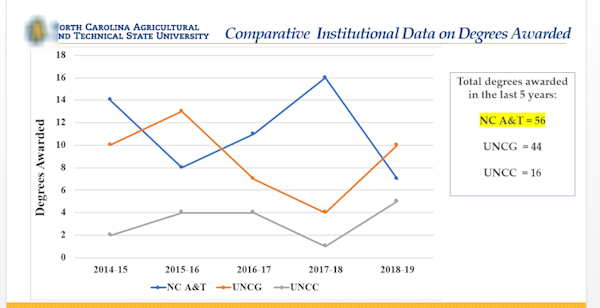 |
|
Clearly UNC Board of Governors and UNC
General Administration exploited HBCU NC A&T
Engineering circular and research to
establish Nanoscience MS and Ph.D. at
cross-town white UNC Greensboro. |
|
| |
 |
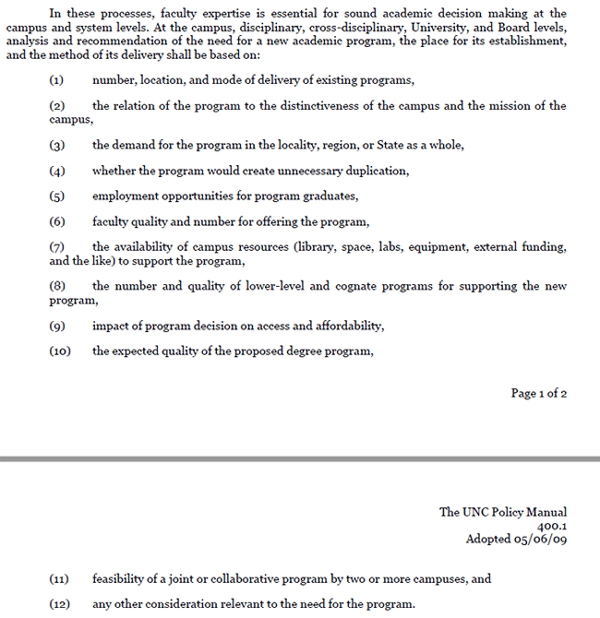 |
| |
|
The National Center for
Educational Statistics
(NCES) responsible for
collecting and
presenting statistical
data and information for
the nation; classifies
Nanoscience and
Nanoengineering as
Nanotechnology CIP
15.1601: Engineering
technologies and
Engineering related
fields. |
 |
|
PCG/UNC-NCCCS/UNC Interim report 3.doc/RB.SP.PC.CR.ATPCC.1/CC.14/10May05 |
|
|
|
Historical
black
North
Carolina
A&T, as
one of
the
state's
two land
grant
institutions,
has
programs
through
the
doctoral
level.
Its
programs
include
engineering,
arts and
sciences,
agricultural
and
environmental
sciences,
business
and
economics,
education,
nursing,
technology,
and
graduates
studies.
“The
expected
roles of
a
land-grant
institution,
is
teaching
agriculture
and
engineering,
and
providing
cooperative
extension
services”
. |
 |
|
|
For Liberal Arts UNC
Greensboro with
doctorial programs in
music and nursing to
offer Nanoscience
degrees requires access
to NC A&T academic
programs and research:
“Although the degree is
in Nanoscience (does not
include
Nanoengineering),

students will be given
the opportunity to take
relevant courses at the School
of Engineering at North
Carolina A&T University
and must be able to work
on collaborative
projects with faculty in
the School of
Engineering. |
| |
|
Unlike land grant
cross-town historical
Black NCA&T with strong
programs in engineering
offering Nanoscience
constituted a
Substantive Change as
defined by SACS from
previous approved
circular at historical
white women UNCG with
strong programs in
liberal Arts. (UNCG)
Rebecca Adams to (SACS)
Tom Benberg: Sarah
Armstrong Subject:
Request for
interpretation of
accuracy of nanoscience
message, April 13, 2010:
The bottom line,
however, is that we need
to submit a full
prospectus and need to
do so as soon as
possible. This request
will be for approval to
initiate a new
off-campus site (South
Campus) and to initiate
a new degree program (MS
in Nanoscience) at that
site. Contrary to
previous
interpretations, both
represent substantive
changes.. Due to the
confusion, they are
willing to waive the
requirement that we do
so 6 months in advance
and will usher it though
the approval process in
a timely way so that we
can accept students into
UNCG's MS in Nanoscience
program next fall. |
| |
|
”The
addition
of a
doctoral
program
is
not
an
easy
or
simple
extension
of
the
master’s
program.
Unlike
most
master’s
programs,
a
doctoral
program
is
research-based.
While
doctoral
program
requirements
routinely
include
additional
course
work,
the
central
program
requirement
is
the
dissertation.
The
topic
for
the
dissertation
normally
derives
from
discussion
with
faculty
who
are
engaged
in
research
and
therefore
knowledgeable
about
the
“frontier
of
knowledge”
in
the
discipline. For
a
faculty
member
to
then
properly
guide
and
assist
the
student’s
dissertation
research,
that
faculty
member
must
be
an
active
researcher. Hence,
the
implementation
of a
doctoral
program
must
be
preceded
by
the
assembling
of
faculty
who
are
conducting
publishable
research
in
that
discipline. UNIVERSITY
OF
NORTH
CAROLINA
PROGRAM
DUPLICATION
STUDY
Submitted
by
James
H.
Woodward
November
1,
2011
p12] |
|
|
NCA&T was 4th in
Funding in
Nanotechnology
Research at
North Carolina
Universities
with $11 Million
Dollars between
2000-2005. UNC
at Greensboro
10th among the
11 institutions
conducted
$45,000 dollars
of
Nanotechnology
research between
2000 thru 2005. |
Nanotechnology
is
Experimental
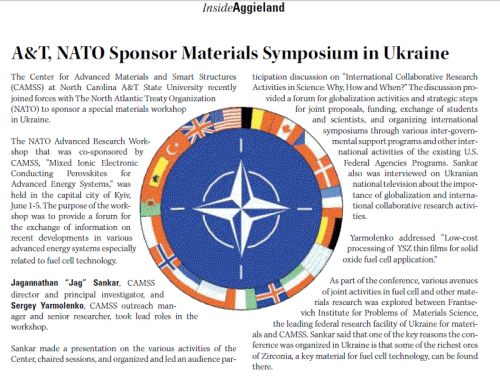 NCA&T
State
University
has been
funded
at an
average
rate of
$3-5
million
per year
in the
area of
nanoscience
and
nanotechnology.
Most of
the
research
in
nanoengineering
is done
in the
Center
for Advanced
Materials
and
Smart
Structures
(CAMSS).
Several
Centers
and
projects
are
under
CAMSS,
including
the NSF
Center
for
Research
Excellence
in
Science
and
Technology
(CREST),
the DoD
Center
for
Nanoscience,
Nanomaterials
and
Multifunctional
Materials
(CNN)
for
Homeland
Security,
the NSF
Nanoscale
Science
and
Engineering
Center (NSEC),
the NSF
project
on
US/Europe
Materials
Collaboration:
Self-Organized
Nanostructured
Thin
Films
for
Catalysis,
the NSF
project
on
Nanoscale
Interdisciplinary
Research
Teams (NIRT),
the NSF
Major
Research
Instrumentation
for
Nanoengineering
Research,
and the
NSF
Nanotechnology
Undergraduate
Education
(NUE)
program.
CAMSS
also
facilitates
many of
the
materials
research
activities
of the
NASA-National
Institute
for
Aerospace
(NIA).
In
addition, the
Center
for
Composite
Materials
Research
(CCMR)
does
research
in
nano-enhanced
composite
materials
and the
Army
Center
of
Excellence
for
Battlefield
Capability
Enhancements
(Flexible
Displays)
does
research
in
material
characterization
and
development
of novel
displays. NCA&T
State
University
has been
funded
at an
average
rate of
$3-5
million
per year
in the
area of
nanoscience
and
nanotechnology.
Most of
the
research
in
nanoengineering
is done
in the
Center
for Advanced
Materials
and
Smart
Structures
(CAMSS).
Several
Centers
and
projects
are
under
CAMSS,
including
the NSF
Center
for
Research
Excellence
in
Science
and
Technology
(CREST),
the DoD
Center
for
Nanoscience,
Nanomaterials
and
Multifunctional
Materials
(CNN)
for
Homeland
Security,
the NSF
Nanoscale
Science
and
Engineering
Center (NSEC),
the NSF
project
on
US/Europe
Materials
Collaboration:
Self-Organized
Nanostructured
Thin
Films
for
Catalysis,
the NSF
project
on
Nanoscale
Interdisciplinary
Research
Teams (NIRT),
the NSF
Major
Research
Instrumentation
for
Nanoengineering
Research,
and the
NSF
Nanotechnology
Undergraduate
Education
(NUE)
program.
CAMSS
also
facilitates
many of
the
materials
research
activities
of the
NASA-National
Institute
for
Aerospace
(NIA).
In
addition, the
Center
for
Composite
Materials
Research
(CCMR)
does
research
in
nano-enhanced
composite
materials
and the
Army
Center
of
Excellence
for
Battlefield
Capability
Enhancements
(Flexible
Displays)
does
research
in
material
characterization
and
development
of novel
displays. |
|
|
| |
|
Unambiguous North
Carolina A&T State
University was the
better host base on :
(1)
number, location, and
mode of delivery of
existing programs,
(2) the relation of the
program to the
distinctiveness of the
campus and the mission
of the campus,
(3) the demand for the
program in the locality,
region, or State as a
whole,
(4) whether the program
would create unnecessary
duplication,
(5) employment
opportunities for
program graduates,
(6) faculty quality and
number for offering the
program,
(7) the availability of
campus resources
(library, space, labs,
equipment, external
funding, and the like)
to support the program,
(8) the number and
quality of lower-level
and cognate programs for
supporting the new
program,
(9) impact of program
decision on access and
affordability,
(10) the expected
quality of the proposed
degree program, |
|
|
| |
|
Southern
Commission on Colleges
Association complicit with UNC
Board of Governors white wash
UNC Greensboro Nanoscience MS
and PhD degrees authorizations
in order for UNCG to accept
students into UNCG's MS in
Nanoscience program the next
fall link |
|
| |
|
* BOG Meeting Material Graphic |
|
[2] Ribbon Cutting Sets Gateway
Project in Motion, The Aggie Report
VOLUME EIGHT - NUMBER TWENTY - MAY
25, 2007 ]. |
|
[3] A&T
CHANCELLOR PLANS TO RETIRE: FORT:
GOALS COMPLETE, Greensboro News &
Record - Friday, May 29, 1998 , BETH
MCMURTRIE Staff Writer |
|
4] UNCG and NC A&T partner to create
joint program in nanotechnology,
Sharlini Sankaran, October 8, 2007,
North Carolina Board of Science and
Technology, |
| 5 [5] UNC-G,
A&T to seek $65M for nanotech
school, Matt Evans The Business
Journal Serving the Greater Triad
Area, Nov 13, 2006 |
|
[6]
Request to Establish NCA&T/UNCG
Joint School of Nanoscience and
Nanoengineering March 5, 2007 |
|
[7] ENGINEERING CENTER PLUGGED
Greensboro News & Record - Saturday,
December 14, 1991 Author: JUSTIN
CATANOSO Staff Writer |
|
[11] Jonnelle
Davis (Nano, money No.1 on A&T,
UNC-G list News & Record 10.04.2010) |
| [12]
[UNCG Chancellor William E. Moran]
[IM BASS UNIVERSITIES LAY CLAIM TO
FUTURE - A&T, UNCG EAGER TO BOOST
SCIENCE, ENGINEERING PROGRAMS
Greensboro News & Record - Sunday,
January 27, 1991 |
| [13] Nanobiotechnology Center of
Innovation North Carolina
Biotechnology Center 20/11/2007 |
|
[15] High Research Activity The
Scientist http://www.the-scientist.com/2007/03/01/s31/1 |
| [16]Jack
Scism TRIAD
SCIENTIFIC RESEARCH CENTER: VIABLE
DREAM OR PIE IN THE SKY? , JACK
SCISM, Greensboro News & Record -
Monday, July 20, 1992 |
| [17] [Wilbur
Ross forms partnership to invest in
nanotech firms Monday, May 23, 2005
http://triad.bizjournals.com/triad/stories/2005/05/23/daily6.html |
| [18][UNCG, A&T University will
need to be leaders in the charge for
high-tech industry in the Triad Nov
9, 1998, 12:00am EST Ken Mayer
Editorial |
| [19] [2] UNIVERSITIES
TO SIGN RESEARCH Agreement,
Greensboro News &Record - Wednesday,
May 19, 1999 , Author: TIM THORNTON
Staff Writer |
|
Alleged
Dr. Alton Thomas and David H. Perrin
signed transmittal to Dr. Belle
Wheelan, President, COC dated May
24, 2010 |
|
[20]UNCG and NC A&T partner to
create joint program in
nanotechnology, Sharlini Sankaran,
October 8, 2007, North Carolina
Board of Science and Technology, |
|
[26] Kevin
Holland, Contracting Officer GSA July
3, 2006 letter to John Merrill. Re:
U.S. Department of Agriculture,
natural Resources Conservation
Service (NRCS) Lease Project,
Greensboro , NC |
| [27] Could Greensboro Support
Research Park? News & Record
Oct.19.1997 Beth McMurtrie. |
| [34] letter
dated November
20, 2008 to
Dr. Beele Wheelan, President
Commission on Colleges, SACS
allegedly by Alton Thompson (NC A&T)
and David Perrin (UNCG) |
|
|
| |
| |
|
|
Information on this site has been included in
good faith for general informational purposes only. It is not
intended to amount to advice on which you should rely, and we give
no representation, warranty or guarantee, whether express or implied
as to its accuracy or completeness. You must obtain professional or
specialist advice before taking, or refraining from, any action on
the basis of the content on our site. |
|
All Rights Reserved |









 Reported
in the Media:
Reported
in the Media: 





 Loud
and Clear
Loud
and Clear
 " I
am so energized by the potential of
this research park, in
particular the joint schools of nano
technology and nano science. The
world is seeing explosive growth
today in the commercialization of
nanotechnology. We will have all of
the assets right here in Guilford
County that we need to
participate in that explosion, and
they will be right here at the Gateway
University Research Park." said
("Greensboro Boy" )
" I
am so energized by the potential of
this research park, in
particular the joint schools of nano
technology and nano science. The
world is seeing explosive growth
today in the commercialization of
nanotechnology. We will have all of
the assets right here in Guilford
County that we need to
participate in that explosion, and
they will be right here at the Gateway
University Research Park." said
("Greensboro Boy" ) 







 NCGS
116-198-34(8b) That designation shall be
based on an express finding by the Board of
Governors that the institution desiring to
create a Millennial Campus has the
administrative and fiscal capability to
create and maintain such a campus.
Furthermore, the Board of Governors has
found that creating the constituent
institution’s Millennial Campus will enhance
the university’s research, teaching, and
service missions, as well as enhance the
economic development of the region served by
the institution.
NCGS
116-198-34(8b) That designation shall be
based on an express finding by the Board of
Governors that the institution desiring to
create a Millennial Campus has the
administrative and fiscal capability to
create and maintain such a campus.
Furthermore, the Board of Governors has
found that creating the constituent
institution’s Millennial Campus will enhance
the university’s research, teaching, and
service missions, as well as enhance the
economic development of the region served by
the institution.








 Campus
at the farm, credited in the media as the work of UNC-G
district NC Senator Kay Hagan, June 30, 2003, the
General Assembly, Session Law 2003-294, Section 6.20,
reallocated former Central School of the Deaf from the
State property Office to UNC BOG to be used for the
establishment of Millennium campuses of the University
of North Carolina at Greensboro and North Carolina
Agricultural and Technical State University.
Campus
at the farm, credited in the media as the work of UNC-G
district NC Senator Kay Hagan, June 30, 2003, the
General Assembly, Session Law 2003-294, Section 6.20,
reallocated former Central School of the Deaf from the
State property Office to UNC BOG to be used for the
establishment of Millennium campuses of the University
of North Carolina at Greensboro and North Carolina
Agricultural and Technical State University.



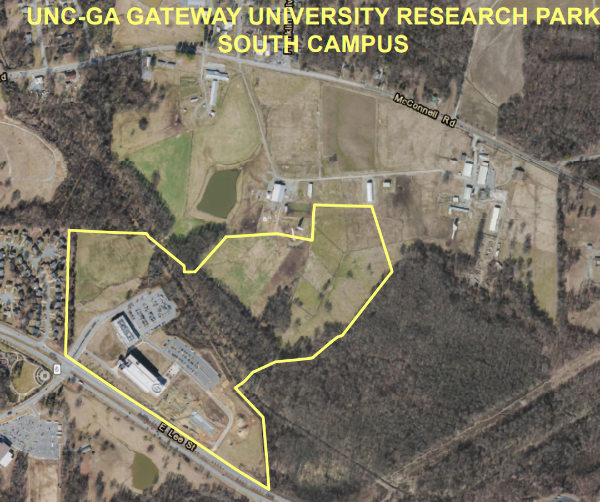

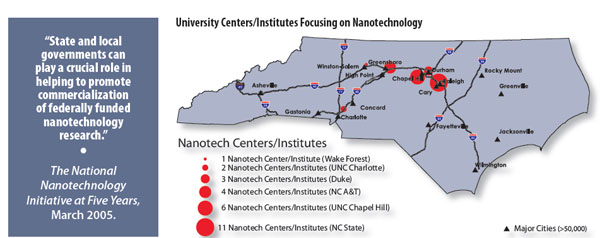


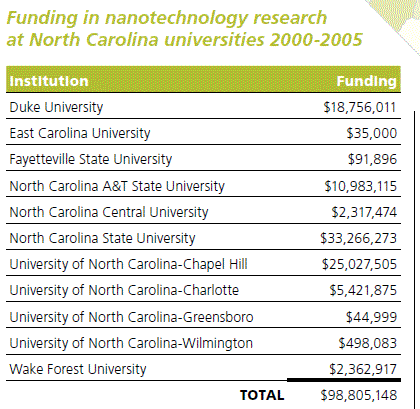












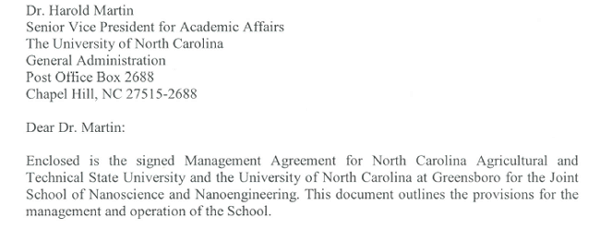
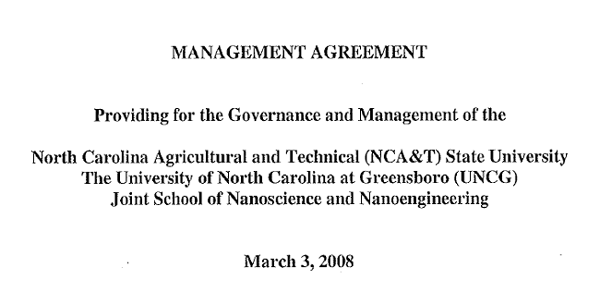
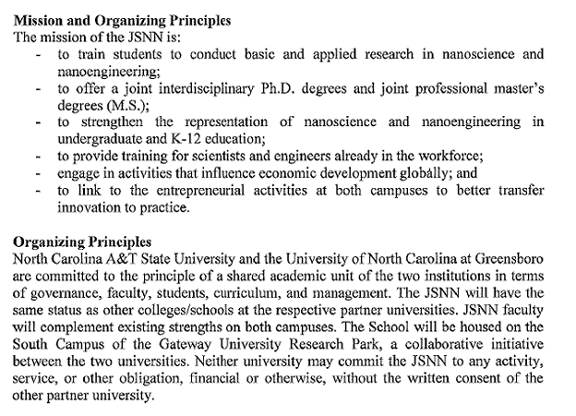





 declined
to comment on the proposal because
it had not yet been presented to the
A&T trustees. It must be approved
by both schools before it can be
submitted to the UNC General
Administration for evaluation. “
declined
to comment on the proposal because
it had not yet been presented to the
A&T trustees. It must be approved
by both schools before it can be
submitted to the UNC General
Administration for evaluation. “



